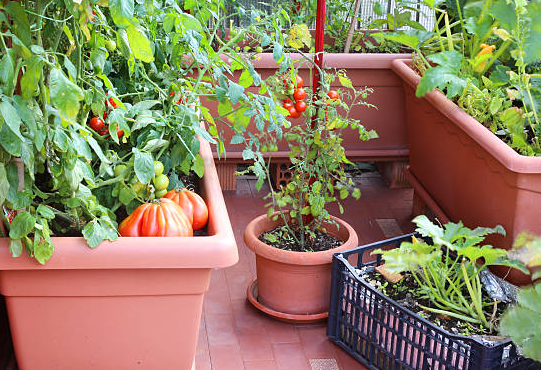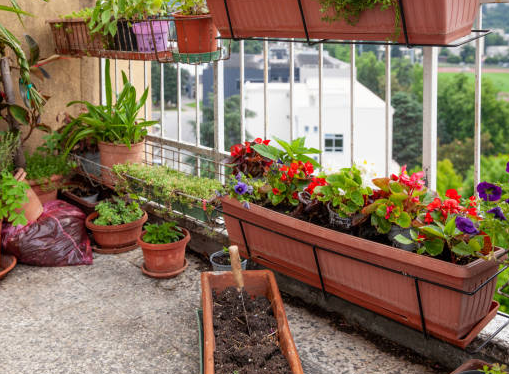Balcony gardens have become increasingly popular in modern life. Whether you’re growing beautiful ornamental flowers or cultivating common herbs, these “mini oases” not only beautify the environment but also improve air quality. However, many people encounter a common problem when gardening on their balconies: pests. Pests can harm plant health, prevent flowers from blooming, and even lead to plant death. So, how can you effectively control pests in a balcony garden? Here are some key tips to help you maintain the beauty and health of your garden using natural pest control methods.

Common Issue: Why are Balcony Gardens Prone to Pests?
Although balcony gardens are small, the light, humidity, and ventilation conditions can attract pests like aphids, whiteflies, and spider mites. Furthermore, the variety of plants commonly grown on balconies provides an ideal breeding ground for these pests. Many people mistakenly think that frequent use of chemical insecticides will solve the problem, but overusing chemicals can not only harm plants but also pose risks to your health.
Therefore, using natural pest control methods is a more sustainable and eco-friendly approach to garden maintenance, helping to protect your plants while minimizing environmental impact.
5 Key Natural Pest Control Tips
1. Strengthen Your Plants’ Natural Defenses
Healthy plants are better equipped to resist pests, so boosting their resilience is essential. Here are a few ways to strengthen plant immunity:
-
Fertilize Properly: In addition to nitrogen fertilizers, balance your phosphorus and potassium levels to promote root development and healthy leaves. For example, you can spray a mixture of 2 grams of potassium dihydrogen phosphate in 1 liter of water on the leaves every 20 days to improve plant resistance.
-
Add Trace Elements: Boron, zinc, and molybdenum significantly improve plant immunity. For example, mix 10-15 grams of boron molybdate in 30 pounds of water and spray it once a month.
-
Avoid Overwatering: Too much water can create a breeding ground for pests and diseases, so water your plants moderately, ensuring the soil remains slightly moist but not soggy.
Tip: Plants that are weak or have yellowing leaves are more prone to pest attacks. Regular care and proper feeding are essential to preventing pest problems from the start.
2. Use Pest-Repelling Plants
Planting pest-repellent plants on your balcony not only beautifies your garden but also naturally suppresses pest populations. Some common pest-repellent plants include:
-
Mint: Its scent deters aphids and whiteflies.
-
Lavender: Lavender’s fragrance repels mosquitoes and other flying insects.
-
Marigolds: Marigolds are effective at suppressing nematodes in the soil.
Suggestion: Plant these pest-repellent plants along the edges of your balcony to protect your other flowers and enhance the overall aesthetic of your garden.

3. DIY Natural Insecticides
Homemade natural insecticides are a safe and eco-friendly alternative to commercial chemical sprays. Here are some simple recipes:
-
Garlic Spray: Crush 30 grams of garlic and soak it in 1 liter of water for 12 hours. Filter it and spray weekly to repel aphids and spider mites.
-
Soap Solution: Mix 20 grams of neutral soap in 1 liter of water and spray on leaves and stems to kill soft-bodied pests.
-
Chili Pepper Spray: Boil 50 grams of chili peppers, strain, and cool the mixture. Spray it on plants, especially to combat whiteflies.
Note: Although natural insecticides are safe, they should still be used in moderation. After spraying, observe your plants to ensure they don’t experience any leaf burn.
4. Regularly Remove Diseased Leaves and Pest Eggs
Diseased leaves and pest eggs are significant sources of infestations. Regular cleaning and pruning are key:
-
Prune Diseased Leaves: Remove any yellowing, blackened, or pest-damaged leaves immediately to prevent the spread of disease.
-
Soil Management: Regularly loosen the soil and check for pest eggs on the surface. If you find any, replace the top layer of soil and mix in some wood ash for its antibacterial properties.
-
Clean Surrounding Areas: Old flower pots, fallen branches, and leaves can become hiding places for pests. Be sure to clean your balcony regularly to avoid creating pest habitats.
Tip: Dispose of any diseased leaves and dead branches properly—don’t leave them near your balcony or in the trash bin. It’s best to burn or concentrate the waste to eliminate pests.
5. Use Physical Pest Control Methods
Physical pest control is safe and effective for managing pests in small balcony gardens. Here are a few methods:
-
Yellow Sticky Traps: Pests are attracted to yellow, so hanging yellow sticky traps on your balcony can be very effective, especially for whiteflies and aphids.
-
Insect Mesh Covers: For plants like jasmine or roses, you can cover them with fine insect mesh in early summer to prevent pests from entering.
-
Manual Removal: For larger pests like caterpillars, you can simply use tweezers to pick them off the plants.
Tip: While physical pest control is safe, it requires vigilance. Regularly check your plants and take action when needed.
6. Prevent Root Rot to Avoid Pest Infestation
Root rot often attracts pests like worms and grubs, so preventing it is an essential part of pest management:
-
Control Watering Frequency: Water your plants 1-2 times a week in spring and autumn, and increase it slightly in summer, but never let the water pool in the soil.
-
Use Well-Draining Pots: Opt for ceramic or clay pots, which offer better drainage and airflow.
-
Apply Fungicides Regularly: Every 3 months, use a fungicide solution (diluted 500 times) to prevent root rot and fungal infections.
A healthy root system not only prevents pest infestations but also ensures your plants get the nutrients they need to grow strong.
By following these practical tips, you can keep pests at bay and ensure your balcony garden thrives. Remember, gardening requires patience and attention to detail. By combining natural pest control methods with proper plant care, you can protect your plants and promote a healthy, thriving garden while maintaining a safe environment for your family. Happy gardening!

